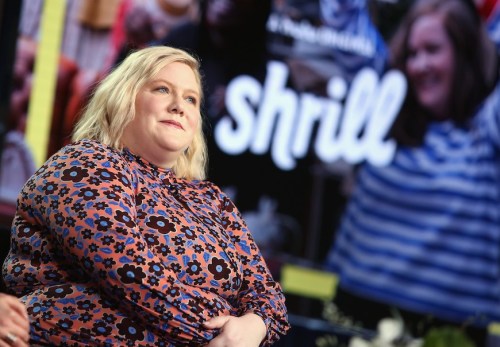Lindy West gets “Shrill” about bathing suits and toxic bosses—and promises to only get louder
Ahead of the body-positive, feminist comedy series "Shrill" premiering on Hulu this Friday, we talk with writer and executive producer Lindy West.

Feminist journalist and author Lindy West has detailed her life on the internet, in print, and—starting Friday, March 15—onscreen. Shrill, the forthcoming, six episode Hulu comedy series, is based on West’s experiences via her best-selling 2016 memoir of the same name. In the show, Aidy Bryant stars as Annie, the West-inspired character who’s a writer at a paper in Portland, Oregon, navigating a symphony of series issues like abortion, body acceptance, a toxic boss, internet trolls, and more—all with the lithe gravitas HBO’s Girls often missed the mark on a handful of years ago.
I caught up with West (who is an executive producer—alongside Elizabeth Banks, Lorne Michaels, and others—and writer on the show) before Shrill hit the streaming service to talk about pool parties, sticking up for yourself at work, and what it means to reclaim negative terms. Spoiler alert: If you call her shrill, she takes it as high praise.
On taking a literal plunge into body positivity
In the fourth episode, Annie attends a body-positive pool party to write about it for work. “That episode is pivotal,” West tells me. Annie has an a-ha moment of personal acceptance spawned from being among fat women in bikinis, on pool floats, thrilled to be in their skin.
In the first few episodes of Shrill, Annie starts “to have inklings that there are other ways to live in her body, and maybe she doesn’t have to just eat sh*t from people and say thank you.” West says the show’s creators wanted her to take the plunge, literally, into body acceptance in a fun and vibrant way and to “allow her to see the reality of other people in other bodies living in other ways.”
“Exposure to different shapes of bodies really does change how you think about bodies” —Lindy West, Shrill writer and executive producer
The scene will resonate with anyone stunted by body self-consciousness who, like West, used to avoid pool parties completely. “I spent years of my life not swimming because I didn’t want to wear a bathing suit in front of other people,” she says. But, after “reorienting my brain and learning that it’s okay to be fat and that fat people can be happy and sexy and beautiful,” West says she continues to dive in to life and pools headfirst.
The episode drives home the point that taking up space is no reason to apologize—to yourself or to anyone else. “Exposure to different shapes of bodies really does change how you think about bodies,” West says.
On standing up for yourself and your career
Throughout the series, Annie is tasked with standing up to her fat-phobic boss, Gabe (played by John Cameron Mitchell), who judges not only her professional capabilities, but her body as well. It’s a storyline that will, no doubt, resonate with plenty of female viewers.
“Professionally, it’s harder for women to be taken seriously,” West says, adding that it can be even more difficult and emotionally laborious for fat women. “Fat people are infantilized at work: People assume they are lazy or not as intellectually capable as thin people, and that’s simply not true.”
“Fat people are infantilized at work: People assume they are lazy or not as intellectually capable as thin people, and that’s simply not true.” —West
She hopes that the scenes where Annie takes on Gabe will not only force people to think about their own unconscious biases in the workplace and beyond, but will also ignite a fire within viewers to take chances on themselves and quiet the naysayers.
Take what happened when a fed-up Annie posts a piece about living in her body titled “Hello, I Am Fat” on her publication’s website —but doesn’t get Gabe’s seal of approval first. The story basically goes viral overnight and proves to her boss that she’s a force to be reckoned with. It also happens to be exactly what West once did IRL to fight back against her bias-riddled work environment.
“I hope people take away that sometimes standing up for yourselves pays off—it certainly did for me” she says. “It was an absolute turning point for me, both professionally and personally. It launched me into the rest of my life when I confronted my boss.”
On the reclaiming the power of being a ‘shrill’ woman
West has been called a lot of things—and now“shrill” is one of her favorites. “Shrill is a word we only use against women, and we use it when it woman is reaching above her station and is being too loud when she’s supposed to be compliant and quiet and small,” she says. “It’s like any other term that’s used to hurt you, and it’s powerful to reclaim those words.”
“I’m not ashamed of being heard. I am shrill, I’m proud to be shrill, and I’m only going to get louder.” —West
West has not only embraced the word as the title of her book (and now TV series), but also as a badge of honor. “I’m not ashamed of being heard. I am shrill, I’m proud to be shrill, and I’m only going to get louder.”
I think it’s about time we all get shrill, ladies.
Want more body-positive empowerment? Check out this open letter by Serena Williams and the great news about body-positive fashion being here to stay.
Sign Up for Our Daily Newsletter
Get all the latest in wellness, trends, food, fitness, beauty, and more delivered right to your inbox.
Got it, you've been added to our email list.








